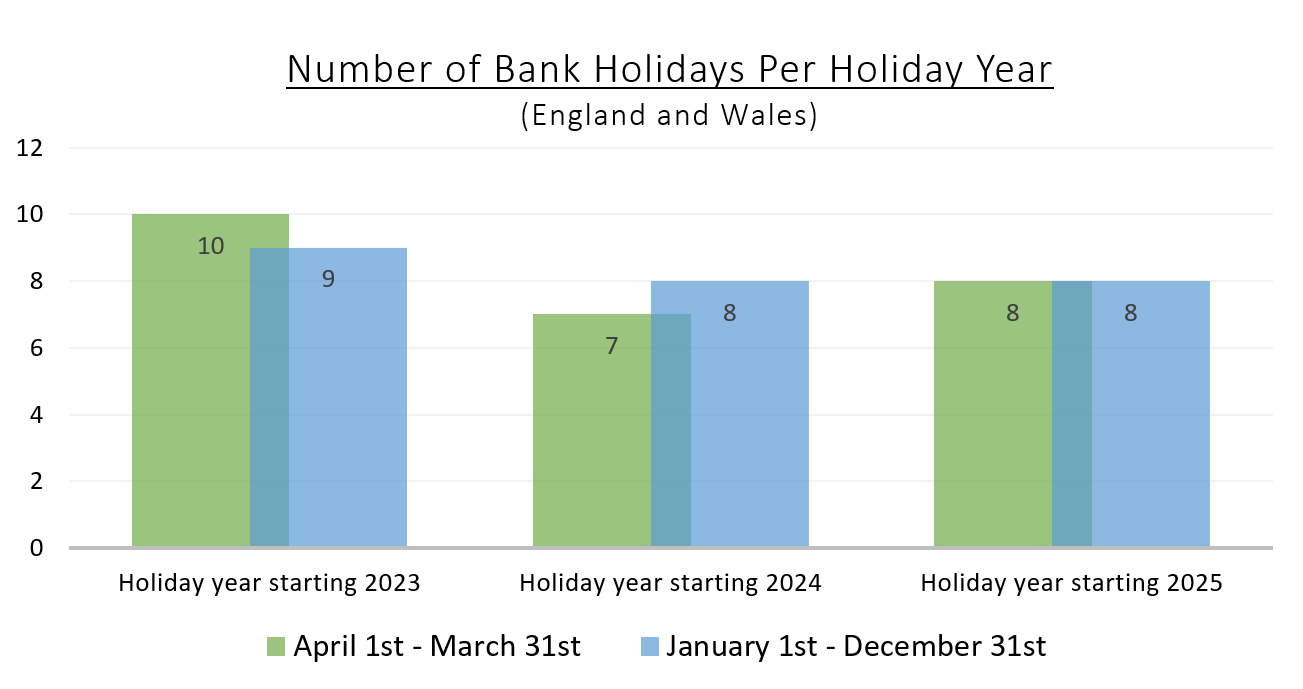
The government has confirmed that there will be an additional bank holiday this year on Monday 8th May 2023 to celebrate King Charles III’s Coronation, which is to take place on Saturday 6th May 2023.
Do employees have the right to take additional bank holidays off?
With King Charles’ coronation bank holiday right around the corner, many employees are wondering whether they are entitled to have the day off work in order to celebrate.
Standard employee bank holiday entitlement is 5.6 weeks’ statutory paid leave per year (limited to 28 days’ leave), although employers can choose to offer more than this.
Interestingly, the Working Time Regulations 1998 do not differentiate between bank holidays and ordinary working days taken as holidays. It is just a flat entitlement to 5.6 weeks’ leave.
Employees’ contracts of employment will often say that bank holidays are included within the employee’s annual leave entitlement. This usually means the employee is required to take those days off work.
However, some employers will require their employees to work on bank holidays. If that is the case, they must ensure their employees still have the benefit of their full statutory minimum annual leave entitlement across the rest of the year.
Employee rights for extra bank holidays
Any right to time off for the usual 8 public and bank holidays – as well as for any additional bank holidays – will depend on the wording of the employee’s contract of employment.
For example, if a contract is worded in such a way as to allow employees paid time off on “any and all bank or public holidays” that fall within the year, that will give the employee the right to a paid day off on Monday 8th May 2023 on account of the King’s Coronation.
However, the position is less clear in cases where the contract specifies that the employee is entitled to “20 days’ annual leave plus 8 days’ bank holiday entitlement”. There are 9 bank holidays in 2023, so the employer will need to confirm the position to staff. It may be that they are granted an additional day off on the May 8th bank holiday on an exceptional basis, or possibly the employer might require the extra day to come out of the remaining 20 days’ entitlement, after the other bank holidays are accounted for.
The need for certainty is significant; if an employee takes time off work on a bank holiday in circumstances where they are not authorised to do so, an employer can treat this as a disciplinary issue. There might also be situations involving disparity of treatment between employees, or confusion over employees’ holiday entitlement for the rest of the year.
So the wording of the terms of employment is important when it comes to understanding employees’ rights.
Wording of contracts and holiday entitlement
As the number of bank holidays per year can sometimes differ, employers may want to ensure contracts of employment are worded in a way which takes account of these changes.
When considering the wording of a contract, employers should also be aware that, depending on when their holiday year starts, the number of bank holidays can differ per holiday year. The below chart illustrates how this can happen, using the example of a holiday year that starts on 1st April (shown in green) as opposed to the calendar year starting 1st January (shown in blue):

Therefore, where an employee’s holiday entitlement is 28 days, if a contract states that “employees are entitled to 20 days’ paid holiday leave plus bank holidays”, this will not be sufficient to meet the statutory minimum where only 7 bank holidays fall within the holiday period.
Equally, the employer may not want an employee to have additional leave where more bank holidays happen to fall within that holiday year. It may be better to state that “employees are entitled to 28 days paid holiday leave inclusive of bank holidays.”
This would account for additional bank holidays, such as King Charles’ coronation bank holiday, while maintaining the statutory minimum. However, employees should be reminded that they are not being granted an extra day’s leave in this instance that the bank holiday would come out of their total entitlement for the year.
Of course, if employers wish for their employees to simply have the day off as an additional day of paid (or unpaid) leave on top of their existing entitlement, a clear announcement to this effect will help staff to plan ahead.
Need advice on annual leave entitlement?
If you’d like to discuss your policies, how the May 8th bank holiday and other additional bank holiday will affect your business, or you have another employment law query, our friendly and knowledgeable employment solicitors can help.
Get in touch with us today on 029 20 437484.

